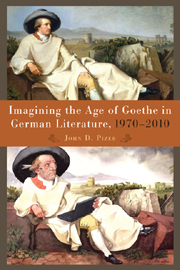Book contents
- Frontmatter
- Contents
- Acknowledgments
- Introduction
- 1 Staging Violence and Transcendence, Embracing Feminism: The Instantiation of Kleist and German Romanticism
- 2 Hölderlins East and West
- 3 Between Feminism and National Identity: The Historical Novels of Renate Feyl
- 4 Goethe Contra and Pro
- 5 Savaging and Salvaging the German Enlightenment
- Conclusion
- Bibliography
- Index
4 - Goethe Contra and Pro
Published online by Cambridge University Press: 05 February 2013
- Frontmatter
- Contents
- Acknowledgments
- Introduction
- 1 Staging Violence and Transcendence, Embracing Feminism: The Instantiation of Kleist and German Romanticism
- 2 Hölderlins East and West
- 3 Between Feminism and National Identity: The Historical Novels of Renate Feyl
- 4 Goethe Contra and Pro
- 5 Savaging and Salvaging the German Enlightenment
- Conclusion
- Bibliography
- Index
Summary
The previous chapters of this book have hinted at a consistent antipathy toward Germany's most canonical writer, Johann Wolfgang Goethe, in German historical fiction from the late 1960s to the present. Chapter 1 examined Christa Wolf's Kein Ort. Nirgends in the context of the German Democratic Republic's embrace of Early Romanticism and its concomitant refutation of a postwar critical orthodoxy led by Georg Lukács, which valorized Goethe and the values of Weimar Classicism. In chapter 2, we saw that fictional treatments of Friedrich Hölderlin in both East and West Germany highlighted the cruel slights this poet received at the hands of Goethe. Goethe's subsequent refusal to aid Hölderlin's career was shown to have played a major role in driving him to madness. In Peter Weiss's play about the Swabian poet, Germany's “poet-prince” is portrayed even more negatively, as not only vengeful and unwilling to get past a petty grudge, but also as a toady to the nobility and the emerging bourgeois capitalist elite. In chapter 3, we noted how in Renate Feyl's novels on Sophie La Roche and Caroline von Wolzogen, Goethe was characterized as rather self-serving and egotistical, although Feyl mitigates this in her novels by casting him as a somewhat misunderstood victim, both of Sophie La Roche's failure to recognize his early genius and of Weimar society's vindictive attitude toward his common-law relationship with Christiane Vulpius.
- Type
- Chapter
- Information
- Imagining the Age of Goethe in German Literature, 1970–2010 , pp. 111 - 155Publisher: Boydell & BrewerPrint publication year: 2011



